Examining Teacher Quality Policies: An In-Depth Analysis of Australia
VerifiedAdded on 2023/06/03
|16
|5446
|307
Essay
AI Summary
This essay provides an in-depth analysis of teacher quality policies in Australia, examining the philosophical understanding of education, teacher quality discourses, and the evaluation of research evidence used in policy discourse. It explores the roles of key actors like the Australian Institute for Teaching and School Leadership (AITSL) and the impact of initiatives such as the Professional Standards for Teachers. The analysis covers critical aspects like teacher distribution, compensation, professional development, teacher preparation through the Teacher Education Ministerial Advisory Group (TEMAG), and the significance of effective principals in ensuring high-quality education. The essay also references the views of Western thinkers like Jean Jacques Rousseau and John Dewey on education and schooling, highlighting different perspectives on the learning process and the role of teachers and schools in shaping individuals and society.
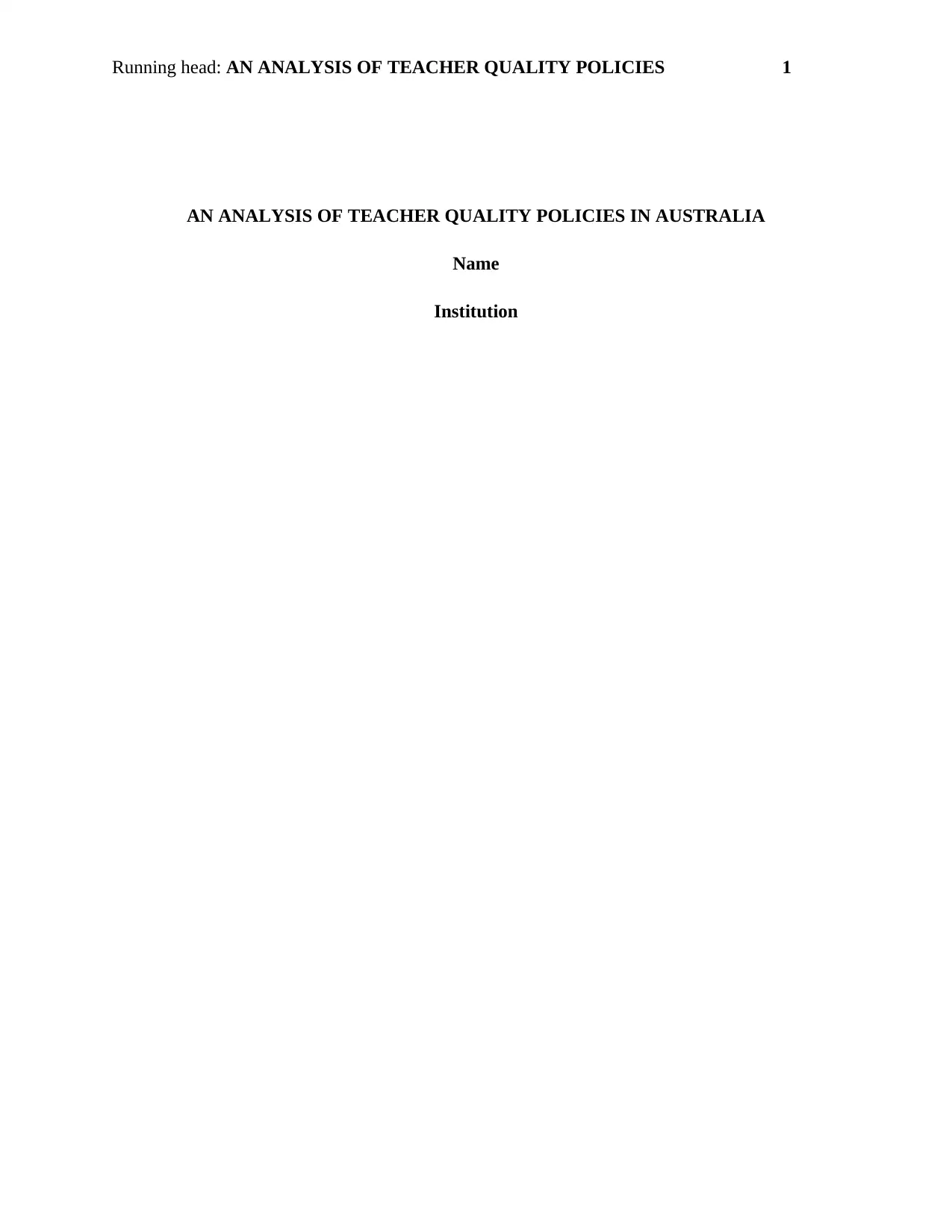
Running head: AN ANALYSIS OF TEACHER QUALITY POLICIES 1
AN ANALYSIS OF TEACHER QUALITY POLICIES IN AUSTRALIA
Name
Institution
AN ANALYSIS OF TEACHER QUALITY POLICIES IN AUSTRALIA
Name
Institution
Paraphrase This Document
Need a fresh take? Get an instant paraphrase of this document with our AI Paraphraser
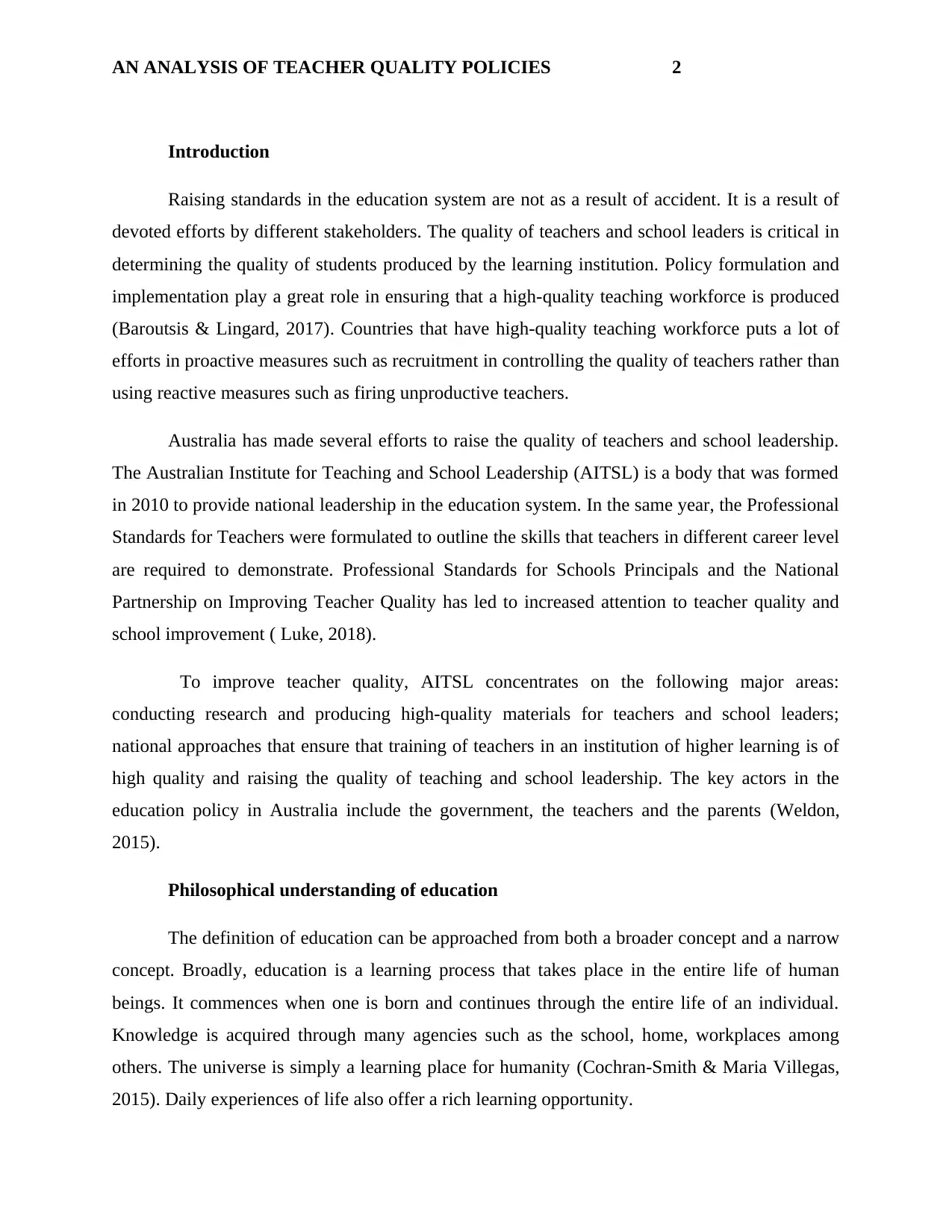
AN ANALYSIS OF TEACHER QUALITY POLICIES 2
Introduction
Raising standards in the education system are not as a result of accident. It is a result of
devoted efforts by different stakeholders. The quality of teachers and school leaders is critical in
determining the quality of students produced by the learning institution. Policy formulation and
implementation play a great role in ensuring that a high-quality teaching workforce is produced
(Baroutsis & Lingard, 2017). Countries that have high-quality teaching workforce puts a lot of
efforts in proactive measures such as recruitment in controlling the quality of teachers rather than
using reactive measures such as firing unproductive teachers.
Australia has made several efforts to raise the quality of teachers and school leadership.
The Australian Institute for Teaching and School Leadership (AITSL) is a body that was formed
in 2010 to provide national leadership in the education system. In the same year, the Professional
Standards for Teachers were formulated to outline the skills that teachers in different career level
are required to demonstrate. Professional Standards for Schools Principals and the National
Partnership on Improving Teacher Quality has led to increased attention to teacher quality and
school improvement ( Luke, 2018).
To improve teacher quality, AITSL concentrates on the following major areas:
conducting research and producing high-quality materials for teachers and school leaders;
national approaches that ensure that training of teachers in an institution of higher learning is of
high quality and raising the quality of teaching and school leadership. The key actors in the
education policy in Australia include the government, the teachers and the parents (Weldon,
2015).
Philosophical understanding of education
The definition of education can be approached from both a broader concept and a narrow
concept. Broadly, education is a learning process that takes place in the entire life of human
beings. It commences when one is born and continues through the entire life of an individual.
Knowledge is acquired through many agencies such as the school, home, workplaces among
others. The universe is simply a learning place for humanity (Cochran-Smith & Maria Villegas,
2015). Daily experiences of life also offer a rich learning opportunity.
Introduction
Raising standards in the education system are not as a result of accident. It is a result of
devoted efforts by different stakeholders. The quality of teachers and school leaders is critical in
determining the quality of students produced by the learning institution. Policy formulation and
implementation play a great role in ensuring that a high-quality teaching workforce is produced
(Baroutsis & Lingard, 2017). Countries that have high-quality teaching workforce puts a lot of
efforts in proactive measures such as recruitment in controlling the quality of teachers rather than
using reactive measures such as firing unproductive teachers.
Australia has made several efforts to raise the quality of teachers and school leadership.
The Australian Institute for Teaching and School Leadership (AITSL) is a body that was formed
in 2010 to provide national leadership in the education system. In the same year, the Professional
Standards for Teachers were formulated to outline the skills that teachers in different career level
are required to demonstrate. Professional Standards for Schools Principals and the National
Partnership on Improving Teacher Quality has led to increased attention to teacher quality and
school improvement ( Luke, 2018).
To improve teacher quality, AITSL concentrates on the following major areas:
conducting research and producing high-quality materials for teachers and school leaders;
national approaches that ensure that training of teachers in an institution of higher learning is of
high quality and raising the quality of teaching and school leadership. The key actors in the
education policy in Australia include the government, the teachers and the parents (Weldon,
2015).
Philosophical understanding of education
The definition of education can be approached from both a broader concept and a narrow
concept. Broadly, education is a learning process that takes place in the entire life of human
beings. It commences when one is born and continues through the entire life of an individual.
Knowledge is acquired through many agencies such as the school, home, workplaces among
others. The universe is simply a learning place for humanity (Cochran-Smith & Maria Villegas,
2015). Daily experiences of life also offer a rich learning opportunity.
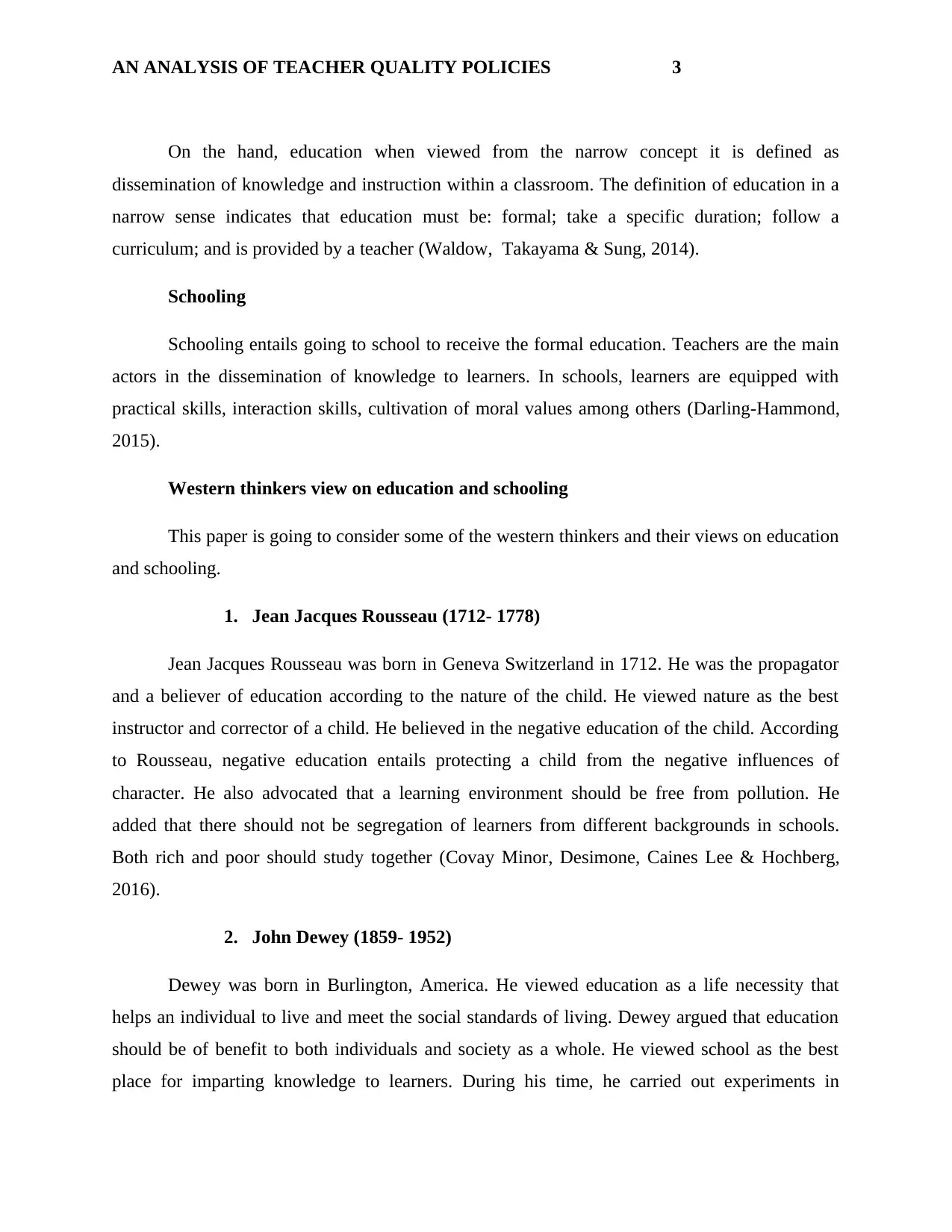
AN ANALYSIS OF TEACHER QUALITY POLICIES 3
On the hand, education when viewed from the narrow concept it is defined as
dissemination of knowledge and instruction within a classroom. The definition of education in a
narrow sense indicates that education must be: formal; take a specific duration; follow a
curriculum; and is provided by a teacher (Waldow, Takayama & Sung, 2014).
Schooling
Schooling entails going to school to receive the formal education. Teachers are the main
actors in the dissemination of knowledge to learners. In schools, learners are equipped with
practical skills, interaction skills, cultivation of moral values among others (Darling-Hammond,
2015).
Western thinkers view on education and schooling
This paper is going to consider some of the western thinkers and their views on education
and schooling.
1. Jean Jacques Rousseau (1712- 1778)
Jean Jacques Rousseau was born in Geneva Switzerland in 1712. He was the propagator
and a believer of education according to the nature of the child. He viewed nature as the best
instructor and corrector of a child. He believed in the negative education of the child. According
to Rousseau, negative education entails protecting a child from the negative influences of
character. He also advocated that a learning environment should be free from pollution. He
added that there should not be segregation of learners from different backgrounds in schools.
Both rich and poor should study together (Covay Minor, Desimone, Caines Lee & Hochberg,
2016).
2. John Dewey (1859- 1952)
Dewey was born in Burlington, America. He viewed education as a life necessity that
helps an individual to live and meet the social standards of living. Dewey argued that education
should be of benefit to both individuals and society as a whole. He viewed school as the best
place for imparting knowledge to learners. During his time, he carried out experiments in
On the hand, education when viewed from the narrow concept it is defined as
dissemination of knowledge and instruction within a classroom. The definition of education in a
narrow sense indicates that education must be: formal; take a specific duration; follow a
curriculum; and is provided by a teacher (Waldow, Takayama & Sung, 2014).
Schooling
Schooling entails going to school to receive the formal education. Teachers are the main
actors in the dissemination of knowledge to learners. In schools, learners are equipped with
practical skills, interaction skills, cultivation of moral values among others (Darling-Hammond,
2015).
Western thinkers view on education and schooling
This paper is going to consider some of the western thinkers and their views on education
and schooling.
1. Jean Jacques Rousseau (1712- 1778)
Jean Jacques Rousseau was born in Geneva Switzerland in 1712. He was the propagator
and a believer of education according to the nature of the child. He viewed nature as the best
instructor and corrector of a child. He believed in the negative education of the child. According
to Rousseau, negative education entails protecting a child from the negative influences of
character. He also advocated that a learning environment should be free from pollution. He
added that there should not be segregation of learners from different backgrounds in schools.
Both rich and poor should study together (Covay Minor, Desimone, Caines Lee & Hochberg,
2016).
2. John Dewey (1859- 1952)
Dewey was born in Burlington, America. He viewed education as a life necessity that
helps an individual to live and meet the social standards of living. Dewey argued that education
should be of benefit to both individuals and society as a whole. He viewed school as the best
place for imparting knowledge to learners. During his time, he carried out experiments in
⊘ This is a preview!⊘
Do you want full access?
Subscribe today to unlock all pages.

Trusted by 1+ million students worldwide
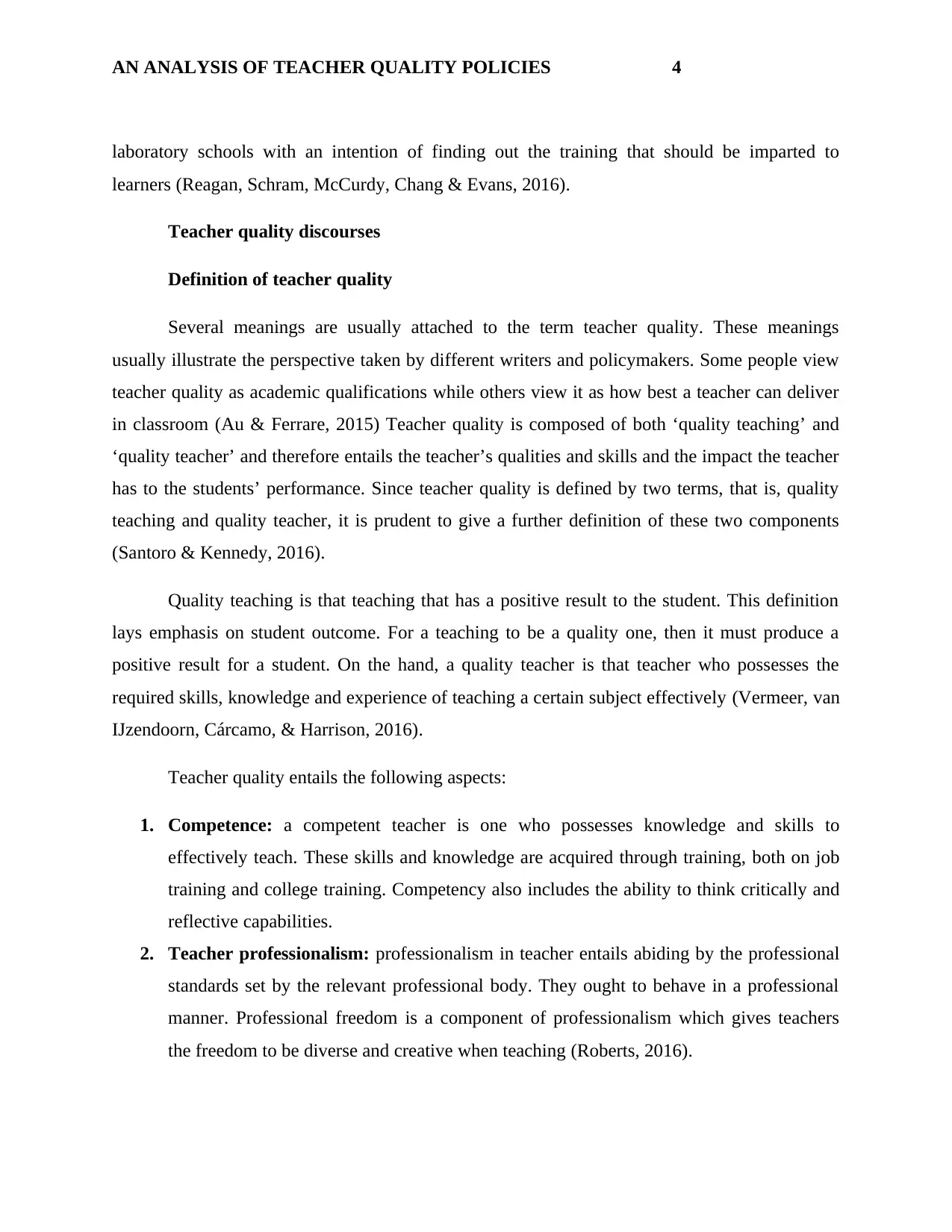
AN ANALYSIS OF TEACHER QUALITY POLICIES 4
laboratory schools with an intention of finding out the training that should be imparted to
learners (Reagan, Schram, McCurdy, Chang & Evans, 2016).
Teacher quality discourses
Definition of teacher quality
Several meanings are usually attached to the term teacher quality. These meanings
usually illustrate the perspective taken by different writers and policymakers. Some people view
teacher quality as academic qualifications while others view it as how best a teacher can deliver
in classroom (Au & Ferrare, 2015) Teacher quality is composed of both ‘quality teaching’ and
‘quality teacher’ and therefore entails the teacher’s qualities and skills and the impact the teacher
has to the students’ performance. Since teacher quality is defined by two terms, that is, quality
teaching and quality teacher, it is prudent to give a further definition of these two components
(Santoro & Kennedy, 2016).
Quality teaching is that teaching that has a positive result to the student. This definition
lays emphasis on student outcome. For a teaching to be a quality one, then it must produce a
positive result for a student. On the hand, a quality teacher is that teacher who possesses the
required skills, knowledge and experience of teaching a certain subject effectively (Vermeer, van
IJzendoorn, Cárcamo, & Harrison, 2016).
Teacher quality entails the following aspects:
1. Competence: a competent teacher is one who possesses knowledge and skills to
effectively teach. These skills and knowledge are acquired through training, both on job
training and college training. Competency also includes the ability to think critically and
reflective capabilities.
2. Teacher professionalism: professionalism in teacher entails abiding by the professional
standards set by the relevant professional body. They ought to behave in a professional
manner. Professional freedom is a component of professionalism which gives teachers
the freedom to be diverse and creative when teaching (Roberts, 2016).
laboratory schools with an intention of finding out the training that should be imparted to
learners (Reagan, Schram, McCurdy, Chang & Evans, 2016).
Teacher quality discourses
Definition of teacher quality
Several meanings are usually attached to the term teacher quality. These meanings
usually illustrate the perspective taken by different writers and policymakers. Some people view
teacher quality as academic qualifications while others view it as how best a teacher can deliver
in classroom (Au & Ferrare, 2015) Teacher quality is composed of both ‘quality teaching’ and
‘quality teacher’ and therefore entails the teacher’s qualities and skills and the impact the teacher
has to the students’ performance. Since teacher quality is defined by two terms, that is, quality
teaching and quality teacher, it is prudent to give a further definition of these two components
(Santoro & Kennedy, 2016).
Quality teaching is that teaching that has a positive result to the student. This definition
lays emphasis on student outcome. For a teaching to be a quality one, then it must produce a
positive result for a student. On the hand, a quality teacher is that teacher who possesses the
required skills, knowledge and experience of teaching a certain subject effectively (Vermeer, van
IJzendoorn, Cárcamo, & Harrison, 2016).
Teacher quality entails the following aspects:
1. Competence: a competent teacher is one who possesses knowledge and skills to
effectively teach. These skills and knowledge are acquired through training, both on job
training and college training. Competency also includes the ability to think critically and
reflective capabilities.
2. Teacher professionalism: professionalism in teacher entails abiding by the professional
standards set by the relevant professional body. They ought to behave in a professional
manner. Professional freedom is a component of professionalism which gives teachers
the freedom to be diverse and creative when teaching (Roberts, 2016).
Paraphrase This Document
Need a fresh take? Get an instant paraphrase of this document with our AI Paraphraser
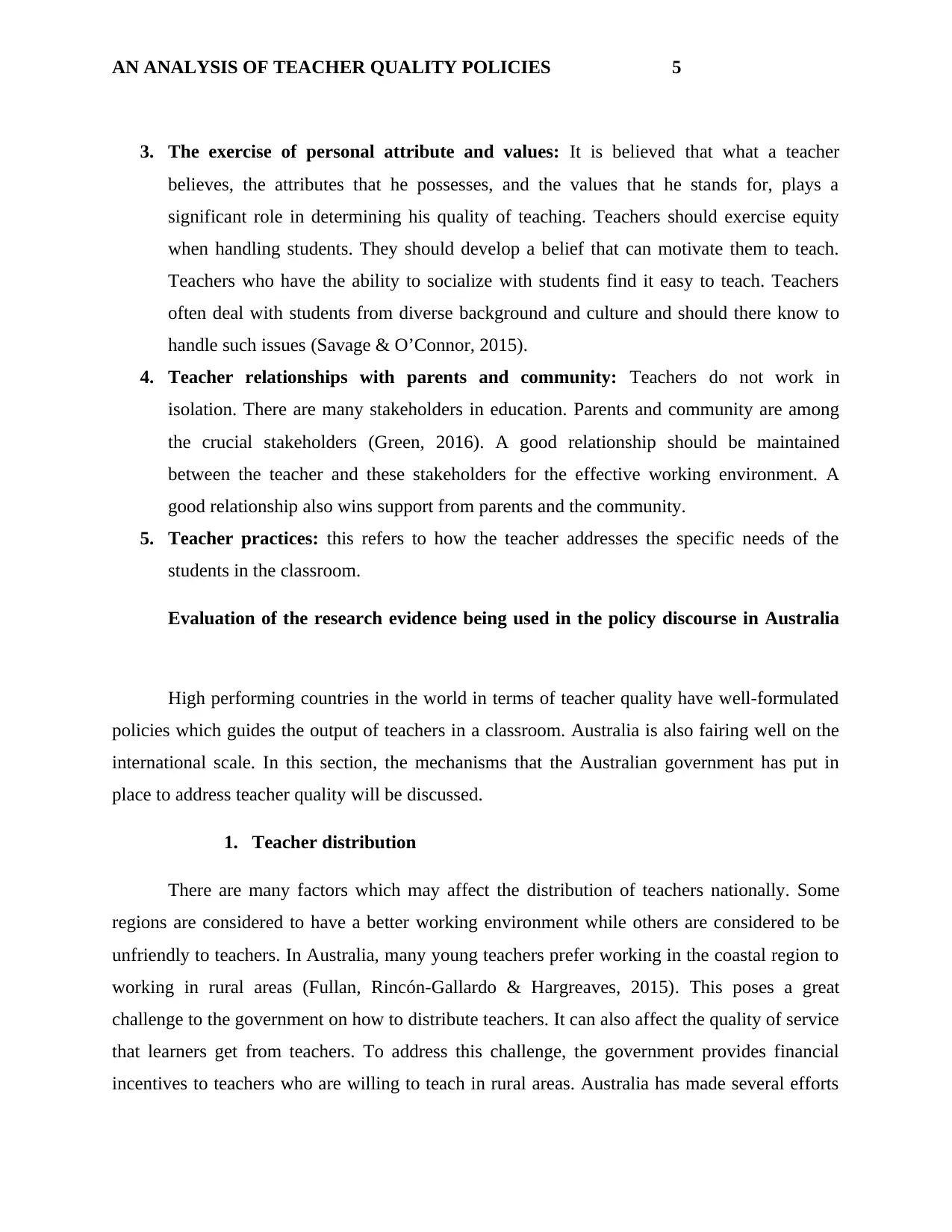
AN ANALYSIS OF TEACHER QUALITY POLICIES 5
3. The exercise of personal attribute and values: It is believed that what a teacher
believes, the attributes that he possesses, and the values that he stands for, plays a
significant role in determining his quality of teaching. Teachers should exercise equity
when handling students. They should develop a belief that can motivate them to teach.
Teachers who have the ability to socialize with students find it easy to teach. Teachers
often deal with students from diverse background and culture and should there know to
handle such issues (Savage & O’Connor, 2015).
4. Teacher relationships with parents and community: Teachers do not work in
isolation. There are many stakeholders in education. Parents and community are among
the crucial stakeholders (Green, 2016). A good relationship should be maintained
between the teacher and these stakeholders for the effective working environment. A
good relationship also wins support from parents and the community.
5. Teacher practices: this refers to how the teacher addresses the specific needs of the
students in the classroom.
Evaluation of the research evidence being used in the policy discourse in Australia
High performing countries in the world in terms of teacher quality have well-formulated
policies which guides the output of teachers in a classroom. Australia is also fairing well on the
international scale. In this section, the mechanisms that the Australian government has put in
place to address teacher quality will be discussed.
1. Teacher distribution
There are many factors which may affect the distribution of teachers nationally. Some
regions are considered to have a better working environment while others are considered to be
unfriendly to teachers. In Australia, many young teachers prefer working in the coastal region to
working in rural areas (Fullan, Rincón-Gallardo & Hargreaves, 2015). This poses a great
challenge to the government on how to distribute teachers. It can also affect the quality of service
that learners get from teachers. To address this challenge, the government provides financial
incentives to teachers who are willing to teach in rural areas. Australia has made several efforts
3. The exercise of personal attribute and values: It is believed that what a teacher
believes, the attributes that he possesses, and the values that he stands for, plays a
significant role in determining his quality of teaching. Teachers should exercise equity
when handling students. They should develop a belief that can motivate them to teach.
Teachers who have the ability to socialize with students find it easy to teach. Teachers
often deal with students from diverse background and culture and should there know to
handle such issues (Savage & O’Connor, 2015).
4. Teacher relationships with parents and community: Teachers do not work in
isolation. There are many stakeholders in education. Parents and community are among
the crucial stakeholders (Green, 2016). A good relationship should be maintained
between the teacher and these stakeholders for the effective working environment. A
good relationship also wins support from parents and the community.
5. Teacher practices: this refers to how the teacher addresses the specific needs of the
students in the classroom.
Evaluation of the research evidence being used in the policy discourse in Australia
High performing countries in the world in terms of teacher quality have well-formulated
policies which guides the output of teachers in a classroom. Australia is also fairing well on the
international scale. In this section, the mechanisms that the Australian government has put in
place to address teacher quality will be discussed.
1. Teacher distribution
There are many factors which may affect the distribution of teachers nationally. Some
regions are considered to have a better working environment while others are considered to be
unfriendly to teachers. In Australia, many young teachers prefer working in the coastal region to
working in rural areas (Fullan, Rincón-Gallardo & Hargreaves, 2015). This poses a great
challenge to the government on how to distribute teachers. It can also affect the quality of service
that learners get from teachers. To address this challenge, the government provides financial
incentives to teachers who are willing to teach in rural areas. Australia has made several efforts
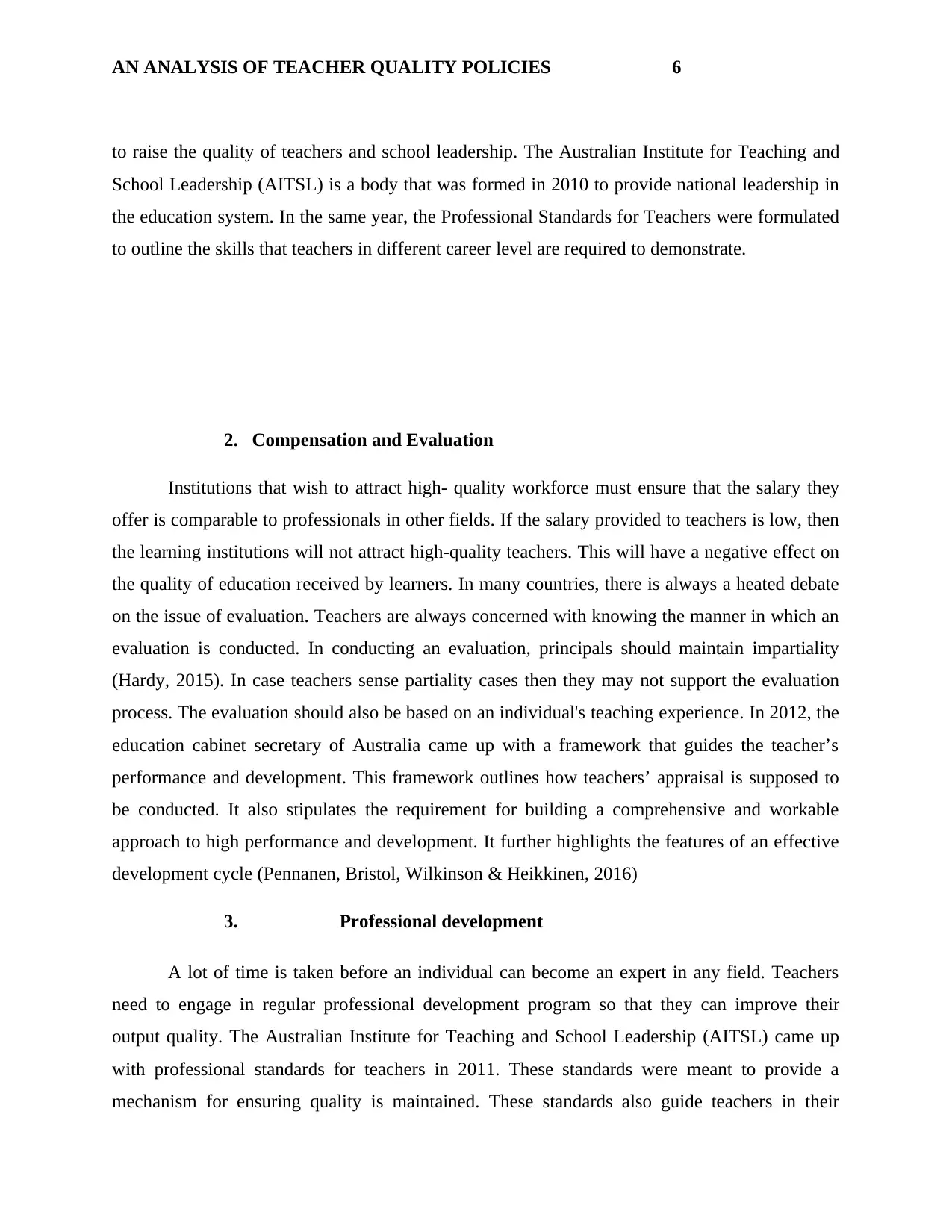
AN ANALYSIS OF TEACHER QUALITY POLICIES 6
to raise the quality of teachers and school leadership. The Australian Institute for Teaching and
School Leadership (AITSL) is a body that was formed in 2010 to provide national leadership in
the education system. In the same year, the Professional Standards for Teachers were formulated
to outline the skills that teachers in different career level are required to demonstrate.
2. Compensation and Evaluation
Institutions that wish to attract high- quality workforce must ensure that the salary they
offer is comparable to professionals in other fields. If the salary provided to teachers is low, then
the learning institutions will not attract high-quality teachers. This will have a negative effect on
the quality of education received by learners. In many countries, there is always a heated debate
on the issue of evaluation. Teachers are always concerned with knowing the manner in which an
evaluation is conducted. In conducting an evaluation, principals should maintain impartiality
(Hardy, 2015). In case teachers sense partiality cases then they may not support the evaluation
process. The evaluation should also be based on an individual's teaching experience. In 2012, the
education cabinet secretary of Australia came up with a framework that guides the teacher’s
performance and development. This framework outlines how teachers’ appraisal is supposed to
be conducted. It also stipulates the requirement for building a comprehensive and workable
approach to high performance and development. It further highlights the features of an effective
development cycle (Pennanen, Bristol, Wilkinson & Heikkinen, 2016)
3. Professional development
A lot of time is taken before an individual can become an expert in any field. Teachers
need to engage in regular professional development program so that they can improve their
output quality. The Australian Institute for Teaching and School Leadership (AITSL) came up
with professional standards for teachers in 2011. These standards were meant to provide a
mechanism for ensuring quality is maintained. These standards also guide teachers in their
to raise the quality of teachers and school leadership. The Australian Institute for Teaching and
School Leadership (AITSL) is a body that was formed in 2010 to provide national leadership in
the education system. In the same year, the Professional Standards for Teachers were formulated
to outline the skills that teachers in different career level are required to demonstrate.
2. Compensation and Evaluation
Institutions that wish to attract high- quality workforce must ensure that the salary they
offer is comparable to professionals in other fields. If the salary provided to teachers is low, then
the learning institutions will not attract high-quality teachers. This will have a negative effect on
the quality of education received by learners. In many countries, there is always a heated debate
on the issue of evaluation. Teachers are always concerned with knowing the manner in which an
evaluation is conducted. In conducting an evaluation, principals should maintain impartiality
(Hardy, 2015). In case teachers sense partiality cases then they may not support the evaluation
process. The evaluation should also be based on an individual's teaching experience. In 2012, the
education cabinet secretary of Australia came up with a framework that guides the teacher’s
performance and development. This framework outlines how teachers’ appraisal is supposed to
be conducted. It also stipulates the requirement for building a comprehensive and workable
approach to high performance and development. It further highlights the features of an effective
development cycle (Pennanen, Bristol, Wilkinson & Heikkinen, 2016)
3. Professional development
A lot of time is taken before an individual can become an expert in any field. Teachers
need to engage in regular professional development program so that they can improve their
output quality. The Australian Institute for Teaching and School Leadership (AITSL) came up
with professional standards for teachers in 2011. These standards were meant to provide a
mechanism for ensuring quality is maintained. These standards also guide teachers in their
⊘ This is a preview!⊘
Do you want full access?
Subscribe today to unlock all pages.

Trusted by 1+ million students worldwide
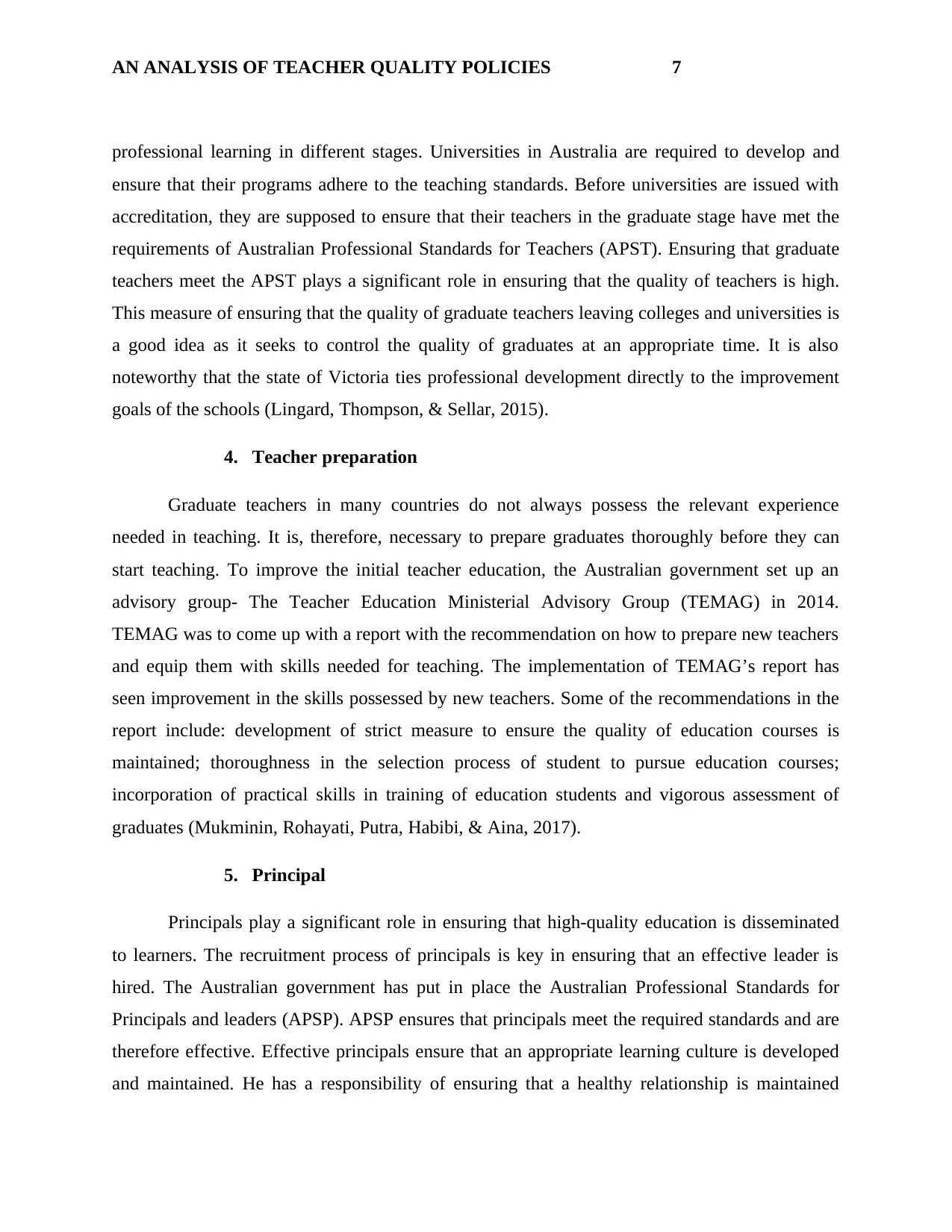
AN ANALYSIS OF TEACHER QUALITY POLICIES 7
professional learning in different stages. Universities in Australia are required to develop and
ensure that their programs adhere to the teaching standards. Before universities are issued with
accreditation, they are supposed to ensure that their teachers in the graduate stage have met the
requirements of Australian Professional Standards for Teachers (APST). Ensuring that graduate
teachers meet the APST plays a significant role in ensuring that the quality of teachers is high.
This measure of ensuring that the quality of graduate teachers leaving colleges and universities is
a good idea as it seeks to control the quality of graduates at an appropriate time. It is also
noteworthy that the state of Victoria ties professional development directly to the improvement
goals of the schools (Lingard, Thompson, & Sellar, 2015).
4. Teacher preparation
Graduate teachers in many countries do not always possess the relevant experience
needed in teaching. It is, therefore, necessary to prepare graduates thoroughly before they can
start teaching. To improve the initial teacher education, the Australian government set up an
advisory group- The Teacher Education Ministerial Advisory Group (TEMAG) in 2014.
TEMAG was to come up with a report with the recommendation on how to prepare new teachers
and equip them with skills needed for teaching. The implementation of TEMAG’s report has
seen improvement in the skills possessed by new teachers. Some of the recommendations in the
report include: development of strict measure to ensure the quality of education courses is
maintained; thoroughness in the selection process of student to pursue education courses;
incorporation of practical skills in training of education students and vigorous assessment of
graduates (Mukminin, Rohayati, Putra, Habibi, & Aina, 2017).
5. Principal
Principals play a significant role in ensuring that high-quality education is disseminated
to learners. The recruitment process of principals is key in ensuring that an effective leader is
hired. The Australian government has put in place the Australian Professional Standards for
Principals and leaders (APSP). APSP ensures that principals meet the required standards and are
therefore effective. Effective principals ensure that an appropriate learning culture is developed
and maintained. He has a responsibility of ensuring that a healthy relationship is maintained
professional learning in different stages. Universities in Australia are required to develop and
ensure that their programs adhere to the teaching standards. Before universities are issued with
accreditation, they are supposed to ensure that their teachers in the graduate stage have met the
requirements of Australian Professional Standards for Teachers (APST). Ensuring that graduate
teachers meet the APST plays a significant role in ensuring that the quality of teachers is high.
This measure of ensuring that the quality of graduate teachers leaving colleges and universities is
a good idea as it seeks to control the quality of graduates at an appropriate time. It is also
noteworthy that the state of Victoria ties professional development directly to the improvement
goals of the schools (Lingard, Thompson, & Sellar, 2015).
4. Teacher preparation
Graduate teachers in many countries do not always possess the relevant experience
needed in teaching. It is, therefore, necessary to prepare graduates thoroughly before they can
start teaching. To improve the initial teacher education, the Australian government set up an
advisory group- The Teacher Education Ministerial Advisory Group (TEMAG) in 2014.
TEMAG was to come up with a report with the recommendation on how to prepare new teachers
and equip them with skills needed for teaching. The implementation of TEMAG’s report has
seen improvement in the skills possessed by new teachers. Some of the recommendations in the
report include: development of strict measure to ensure the quality of education courses is
maintained; thoroughness in the selection process of student to pursue education courses;
incorporation of practical skills in training of education students and vigorous assessment of
graduates (Mukminin, Rohayati, Putra, Habibi, & Aina, 2017).
5. Principal
Principals play a significant role in ensuring that high-quality education is disseminated
to learners. The recruitment process of principals is key in ensuring that an effective leader is
hired. The Australian government has put in place the Australian Professional Standards for
Principals and leaders (APSP). APSP ensures that principals meet the required standards and are
therefore effective. Effective principals ensure that an appropriate learning culture is developed
and maintained. He has a responsibility of ensuring that a healthy relationship is maintained
Paraphrase This Document
Need a fresh take? Get an instant paraphrase of this document with our AI Paraphraser
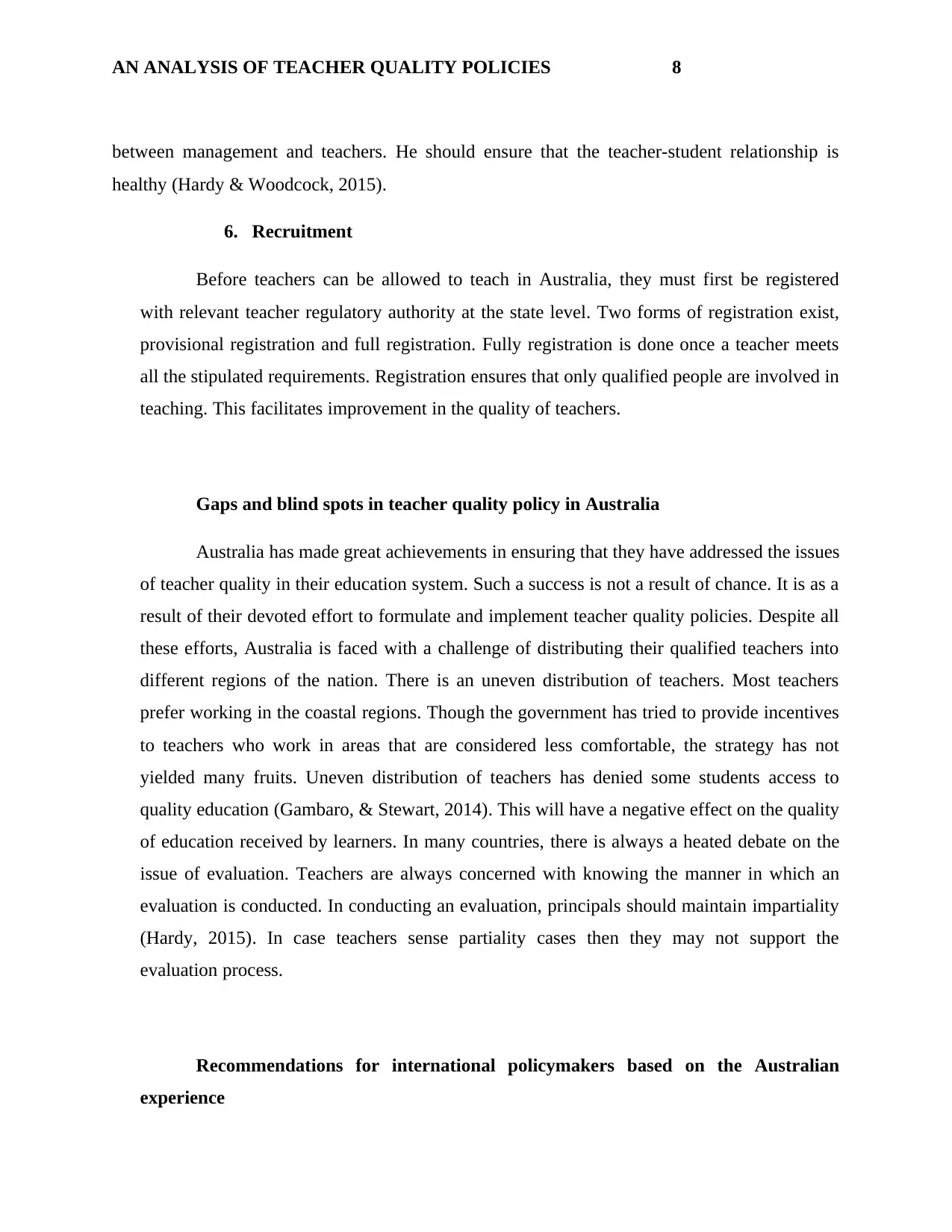
AN ANALYSIS OF TEACHER QUALITY POLICIES 8
between management and teachers. He should ensure that the teacher-student relationship is
healthy (Hardy & Woodcock, 2015).
6. Recruitment
Before teachers can be allowed to teach in Australia, they must first be registered
with relevant teacher regulatory authority at the state level. Two forms of registration exist,
provisional registration and full registration. Fully registration is done once a teacher meets
all the stipulated requirements. Registration ensures that only qualified people are involved in
teaching. This facilitates improvement in the quality of teachers.
Gaps and blind spots in teacher quality policy in Australia
Australia has made great achievements in ensuring that they have addressed the issues
of teacher quality in their education system. Such a success is not a result of chance. It is as a
result of their devoted effort to formulate and implement teacher quality policies. Despite all
these efforts, Australia is faced with a challenge of distributing their qualified teachers into
different regions of the nation. There is an uneven distribution of teachers. Most teachers
prefer working in the coastal regions. Though the government has tried to provide incentives
to teachers who work in areas that are considered less comfortable, the strategy has not
yielded many fruits. Uneven distribution of teachers has denied some students access to
quality education (Gambaro, & Stewart, 2014). This will have a negative effect on the quality
of education received by learners. In many countries, there is always a heated debate on the
issue of evaluation. Teachers are always concerned with knowing the manner in which an
evaluation is conducted. In conducting an evaluation, principals should maintain impartiality
(Hardy, 2015). In case teachers sense partiality cases then they may not support the
evaluation process.
Recommendations for international policymakers based on the Australian
experience
between management and teachers. He should ensure that the teacher-student relationship is
healthy (Hardy & Woodcock, 2015).
6. Recruitment
Before teachers can be allowed to teach in Australia, they must first be registered
with relevant teacher regulatory authority at the state level. Two forms of registration exist,
provisional registration and full registration. Fully registration is done once a teacher meets
all the stipulated requirements. Registration ensures that only qualified people are involved in
teaching. This facilitates improvement in the quality of teachers.
Gaps and blind spots in teacher quality policy in Australia
Australia has made great achievements in ensuring that they have addressed the issues
of teacher quality in their education system. Such a success is not a result of chance. It is as a
result of their devoted effort to formulate and implement teacher quality policies. Despite all
these efforts, Australia is faced with a challenge of distributing their qualified teachers into
different regions of the nation. There is an uneven distribution of teachers. Most teachers
prefer working in the coastal regions. Though the government has tried to provide incentives
to teachers who work in areas that are considered less comfortable, the strategy has not
yielded many fruits. Uneven distribution of teachers has denied some students access to
quality education (Gambaro, & Stewart, 2014). This will have a negative effect on the quality
of education received by learners. In many countries, there is always a heated debate on the
issue of evaluation. Teachers are always concerned with knowing the manner in which an
evaluation is conducted. In conducting an evaluation, principals should maintain impartiality
(Hardy, 2015). In case teachers sense partiality cases then they may not support the
evaluation process.
Recommendations for international policymakers based on the Australian
experience
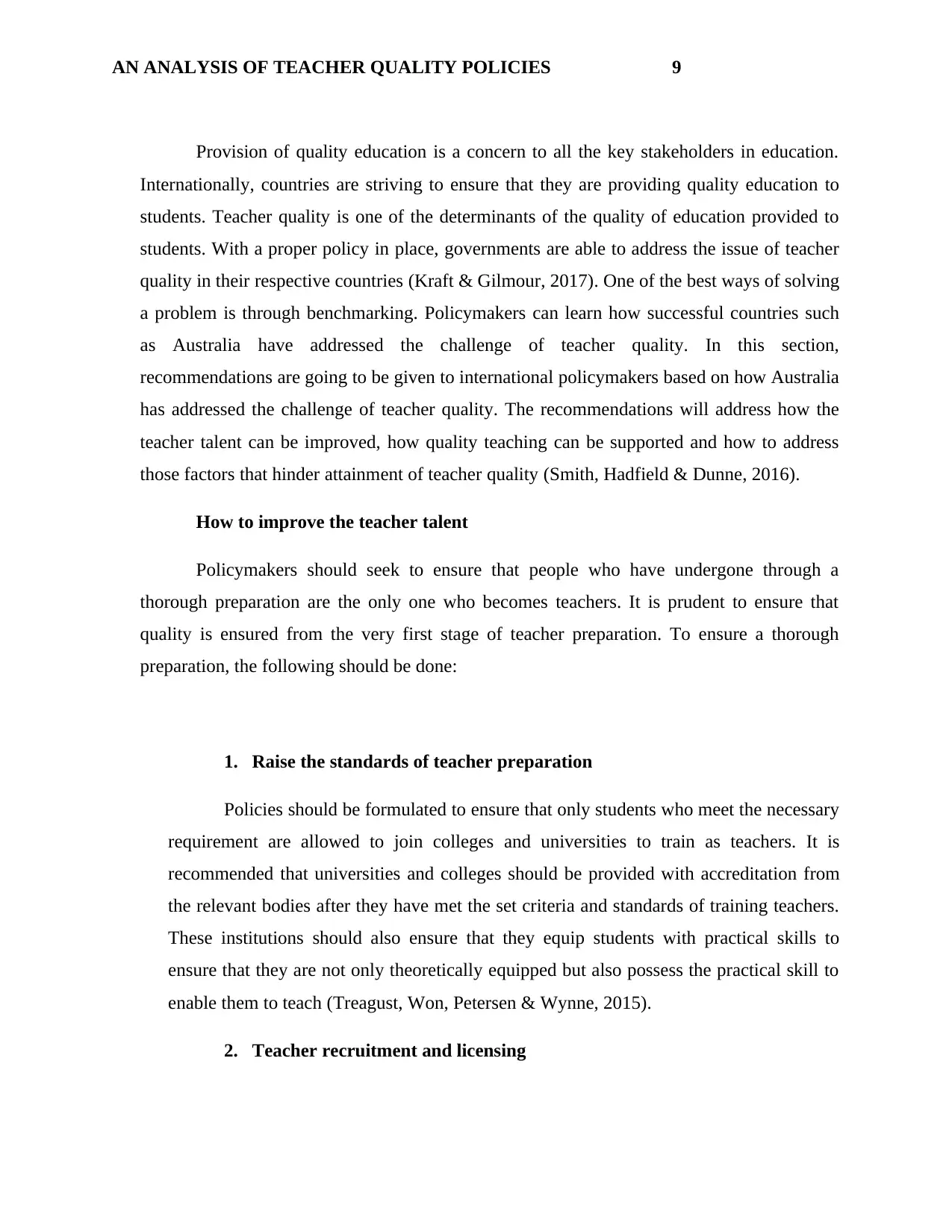
AN ANALYSIS OF TEACHER QUALITY POLICIES 9
Provision of quality education is a concern to all the key stakeholders in education.
Internationally, countries are striving to ensure that they are providing quality education to
students. Teacher quality is one of the determinants of the quality of education provided to
students. With a proper policy in place, governments are able to address the issue of teacher
quality in their respective countries (Kraft & Gilmour, 2017). One of the best ways of solving
a problem is through benchmarking. Policymakers can learn how successful countries such
as Australia have addressed the challenge of teacher quality. In this section,
recommendations are going to be given to international policymakers based on how Australia
has addressed the challenge of teacher quality. The recommendations will address how the
teacher talent can be improved, how quality teaching can be supported and how to address
those factors that hinder attainment of teacher quality (Smith, Hadfield & Dunne, 2016).
How to improve the teacher talent
Policymakers should seek to ensure that people who have undergone through a
thorough preparation are the only one who becomes teachers. It is prudent to ensure that
quality is ensured from the very first stage of teacher preparation. To ensure a thorough
preparation, the following should be done:
1. Raise the standards of teacher preparation
Policies should be formulated to ensure that only students who meet the necessary
requirement are allowed to join colleges and universities to train as teachers. It is
recommended that universities and colleges should be provided with accreditation from
the relevant bodies after they have met the set criteria and standards of training teachers.
These institutions should also ensure that they equip students with practical skills to
ensure that they are not only theoretically equipped but also possess the practical skill to
enable them to teach (Treagust, Won, Petersen & Wynne, 2015).
2. Teacher recruitment and licensing
Provision of quality education is a concern to all the key stakeholders in education.
Internationally, countries are striving to ensure that they are providing quality education to
students. Teacher quality is one of the determinants of the quality of education provided to
students. With a proper policy in place, governments are able to address the issue of teacher
quality in their respective countries (Kraft & Gilmour, 2017). One of the best ways of solving
a problem is through benchmarking. Policymakers can learn how successful countries such
as Australia have addressed the challenge of teacher quality. In this section,
recommendations are going to be given to international policymakers based on how Australia
has addressed the challenge of teacher quality. The recommendations will address how the
teacher talent can be improved, how quality teaching can be supported and how to address
those factors that hinder attainment of teacher quality (Smith, Hadfield & Dunne, 2016).
How to improve the teacher talent
Policymakers should seek to ensure that people who have undergone through a
thorough preparation are the only one who becomes teachers. It is prudent to ensure that
quality is ensured from the very first stage of teacher preparation. To ensure a thorough
preparation, the following should be done:
1. Raise the standards of teacher preparation
Policies should be formulated to ensure that only students who meet the necessary
requirement are allowed to join colleges and universities to train as teachers. It is
recommended that universities and colleges should be provided with accreditation from
the relevant bodies after they have met the set criteria and standards of training teachers.
These institutions should also ensure that they equip students with practical skills to
ensure that they are not only theoretically equipped but also possess the practical skill to
enable them to teach (Treagust, Won, Petersen & Wynne, 2015).
2. Teacher recruitment and licensing
⊘ This is a preview!⊘
Do you want full access?
Subscribe today to unlock all pages.

Trusted by 1+ million students worldwide
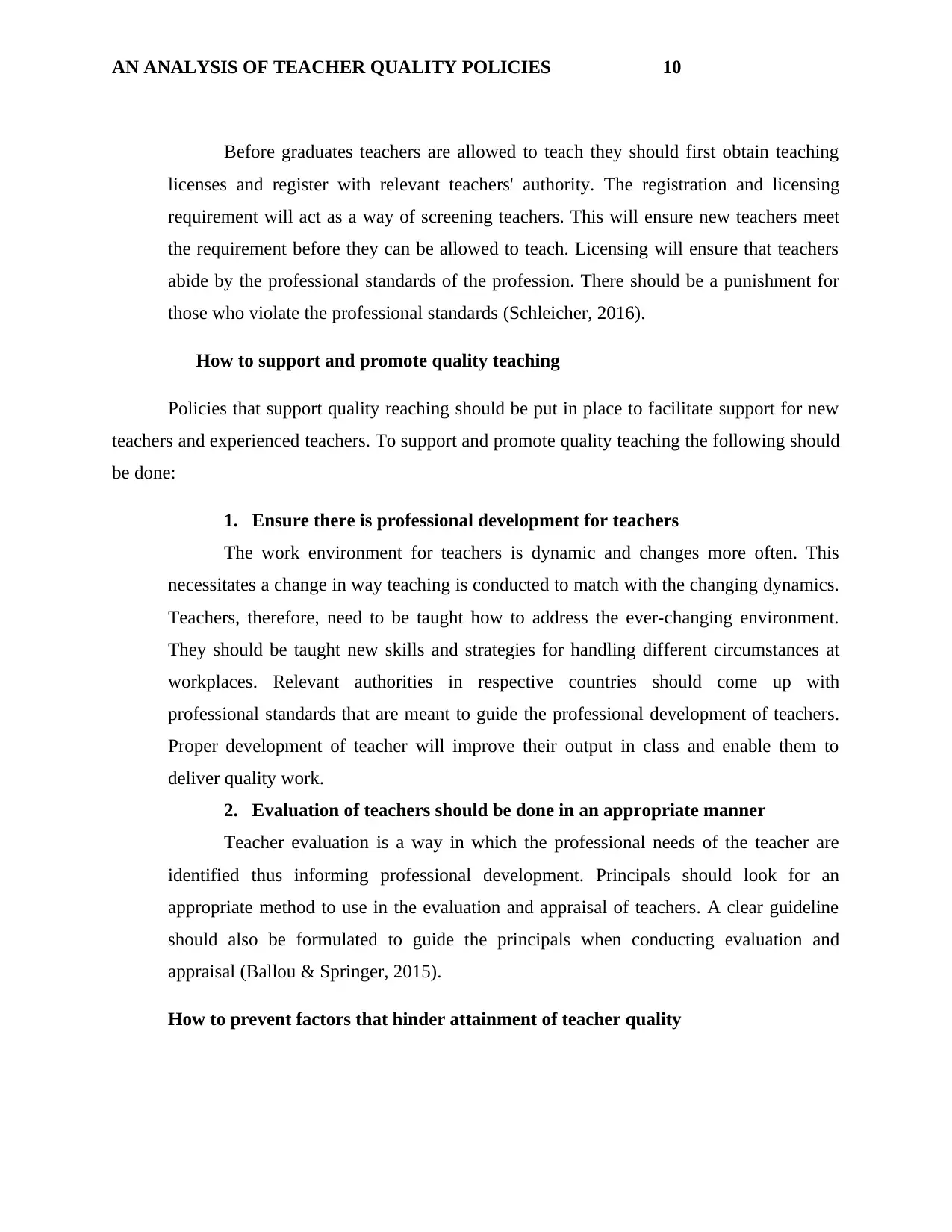
AN ANALYSIS OF TEACHER QUALITY POLICIES 10
Before graduates teachers are allowed to teach they should first obtain teaching
licenses and register with relevant teachers' authority. The registration and licensing
requirement will act as a way of screening teachers. This will ensure new teachers meet
the requirement before they can be allowed to teach. Licensing will ensure that teachers
abide by the professional standards of the profession. There should be a punishment for
those who violate the professional standards (Schleicher, 2016).
How to support and promote quality teaching
Policies that support quality reaching should be put in place to facilitate support for new
teachers and experienced teachers. To support and promote quality teaching the following should
be done:
1. Ensure there is professional development for teachers
The work environment for teachers is dynamic and changes more often. This
necessitates a change in way teaching is conducted to match with the changing dynamics.
Teachers, therefore, need to be taught how to address the ever-changing environment.
They should be taught new skills and strategies for handling different circumstances at
workplaces. Relevant authorities in respective countries should come up with
professional standards that are meant to guide the professional development of teachers.
Proper development of teacher will improve their output in class and enable them to
deliver quality work.
2. Evaluation of teachers should be done in an appropriate manner
Teacher evaluation is a way in which the professional needs of the teacher are
identified thus informing professional development. Principals should look for an
appropriate method to use in the evaluation and appraisal of teachers. A clear guideline
should also be formulated to guide the principals when conducting evaluation and
appraisal (Ballou & Springer, 2015).
How to prevent factors that hinder attainment of teacher quality
Before graduates teachers are allowed to teach they should first obtain teaching
licenses and register with relevant teachers' authority. The registration and licensing
requirement will act as a way of screening teachers. This will ensure new teachers meet
the requirement before they can be allowed to teach. Licensing will ensure that teachers
abide by the professional standards of the profession. There should be a punishment for
those who violate the professional standards (Schleicher, 2016).
How to support and promote quality teaching
Policies that support quality reaching should be put in place to facilitate support for new
teachers and experienced teachers. To support and promote quality teaching the following should
be done:
1. Ensure there is professional development for teachers
The work environment for teachers is dynamic and changes more often. This
necessitates a change in way teaching is conducted to match with the changing dynamics.
Teachers, therefore, need to be taught how to address the ever-changing environment.
They should be taught new skills and strategies for handling different circumstances at
workplaces. Relevant authorities in respective countries should come up with
professional standards that are meant to guide the professional development of teachers.
Proper development of teacher will improve their output in class and enable them to
deliver quality work.
2. Evaluation of teachers should be done in an appropriate manner
Teacher evaluation is a way in which the professional needs of the teacher are
identified thus informing professional development. Principals should look for an
appropriate method to use in the evaluation and appraisal of teachers. A clear guideline
should also be formulated to guide the principals when conducting evaluation and
appraisal (Ballou & Springer, 2015).
How to prevent factors that hinder attainment of teacher quality
Paraphrase This Document
Need a fresh take? Get an instant paraphrase of this document with our AI Paraphraser
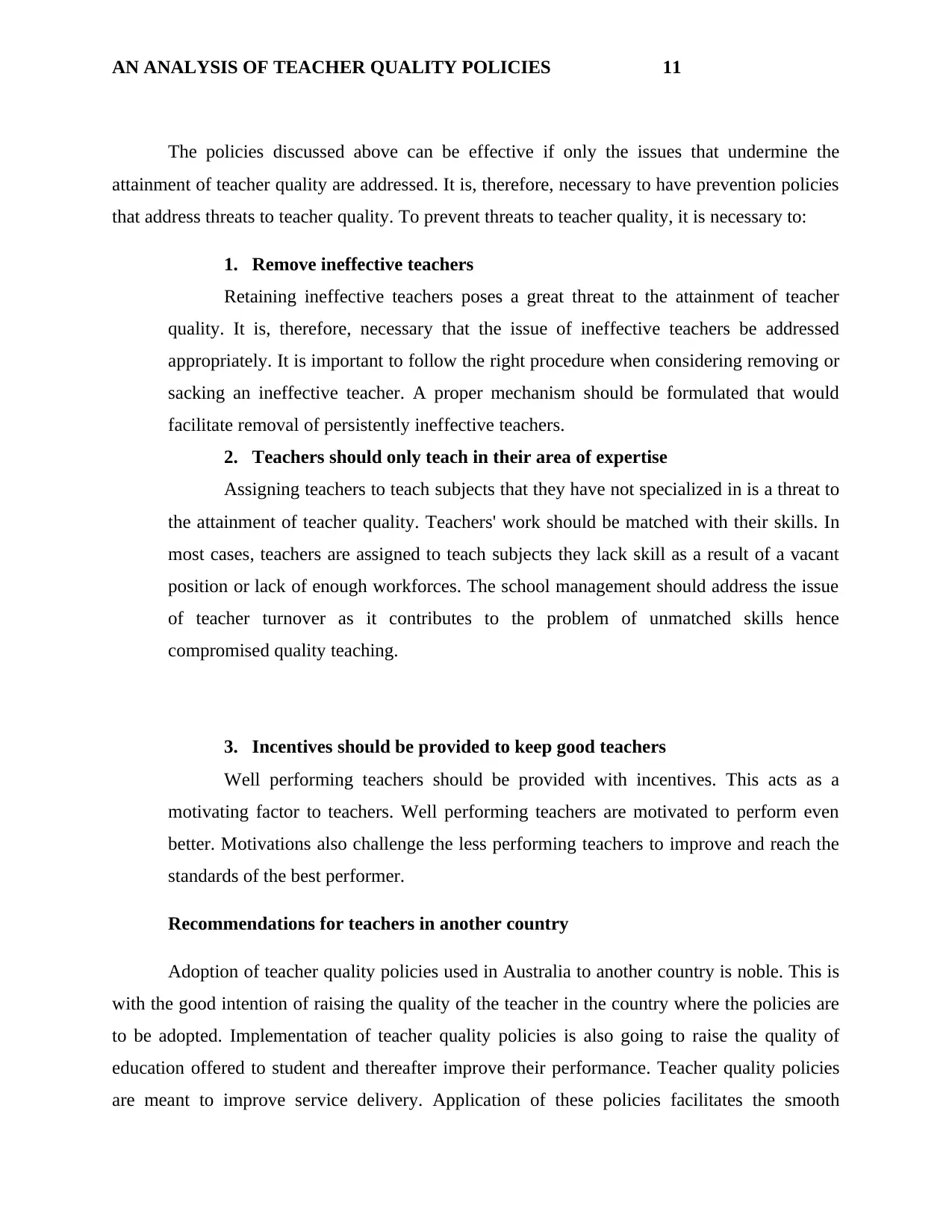
AN ANALYSIS OF TEACHER QUALITY POLICIES 11
The policies discussed above can be effective if only the issues that undermine the
attainment of teacher quality are addressed. It is, therefore, necessary to have prevention policies
that address threats to teacher quality. To prevent threats to teacher quality, it is necessary to:
1. Remove ineffective teachers
Retaining ineffective teachers poses a great threat to the attainment of teacher
quality. It is, therefore, necessary that the issue of ineffective teachers be addressed
appropriately. It is important to follow the right procedure when considering removing or
sacking an ineffective teacher. A proper mechanism should be formulated that would
facilitate removal of persistently ineffective teachers.
2. Teachers should only teach in their area of expertise
Assigning teachers to teach subjects that they have not specialized in is a threat to
the attainment of teacher quality. Teachers' work should be matched with their skills. In
most cases, teachers are assigned to teach subjects they lack skill as a result of a vacant
position or lack of enough workforces. The school management should address the issue
of teacher turnover as it contributes to the problem of unmatched skills hence
compromised quality teaching.
3. Incentives should be provided to keep good teachers
Well performing teachers should be provided with incentives. This acts as a
motivating factor to teachers. Well performing teachers are motivated to perform even
better. Motivations also challenge the less performing teachers to improve and reach the
standards of the best performer.
Recommendations for teachers in another country
Adoption of teacher quality policies used in Australia to another country is noble. This is
with the good intention of raising the quality of the teacher in the country where the policies are
to be adopted. Implementation of teacher quality policies is also going to raise the quality of
education offered to student and thereafter improve their performance. Teacher quality policies
are meant to improve service delivery. Application of these policies facilitates the smooth
The policies discussed above can be effective if only the issues that undermine the
attainment of teacher quality are addressed. It is, therefore, necessary to have prevention policies
that address threats to teacher quality. To prevent threats to teacher quality, it is necessary to:
1. Remove ineffective teachers
Retaining ineffective teachers poses a great threat to the attainment of teacher
quality. It is, therefore, necessary that the issue of ineffective teachers be addressed
appropriately. It is important to follow the right procedure when considering removing or
sacking an ineffective teacher. A proper mechanism should be formulated that would
facilitate removal of persistently ineffective teachers.
2. Teachers should only teach in their area of expertise
Assigning teachers to teach subjects that they have not specialized in is a threat to
the attainment of teacher quality. Teachers' work should be matched with their skills. In
most cases, teachers are assigned to teach subjects they lack skill as a result of a vacant
position or lack of enough workforces. The school management should address the issue
of teacher turnover as it contributes to the problem of unmatched skills hence
compromised quality teaching.
3. Incentives should be provided to keep good teachers
Well performing teachers should be provided with incentives. This acts as a
motivating factor to teachers. Well performing teachers are motivated to perform even
better. Motivations also challenge the less performing teachers to improve and reach the
standards of the best performer.
Recommendations for teachers in another country
Adoption of teacher quality policies used in Australia to another country is noble. This is
with the good intention of raising the quality of the teacher in the country where the policies are
to be adopted. Implementation of teacher quality policies is also going to raise the quality of
education offered to student and thereafter improve their performance. Teacher quality policies
are meant to improve service delivery. Application of these policies facilitates the smooth
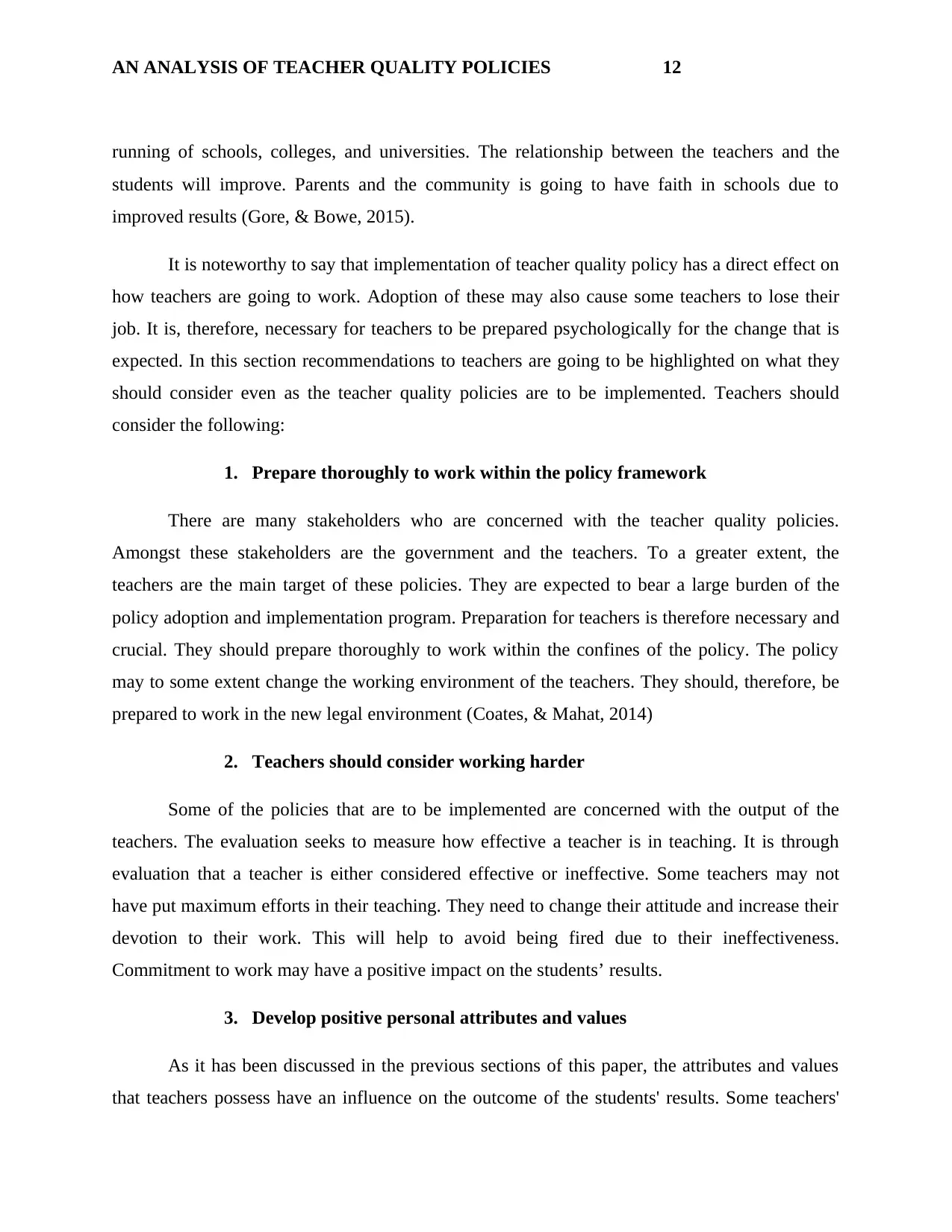
AN ANALYSIS OF TEACHER QUALITY POLICIES 12
running of schools, colleges, and universities. The relationship between the teachers and the
students will improve. Parents and the community is going to have faith in schools due to
improved results (Gore, & Bowe, 2015).
It is noteworthy to say that implementation of teacher quality policy has a direct effect on
how teachers are going to work. Adoption of these may also cause some teachers to lose their
job. It is, therefore, necessary for teachers to be prepared psychologically for the change that is
expected. In this section recommendations to teachers are going to be highlighted on what they
should consider even as the teacher quality policies are to be implemented. Teachers should
consider the following:
1. Prepare thoroughly to work within the policy framework
There are many stakeholders who are concerned with the teacher quality policies.
Amongst these stakeholders are the government and the teachers. To a greater extent, the
teachers are the main target of these policies. They are expected to bear a large burden of the
policy adoption and implementation program. Preparation for teachers is therefore necessary and
crucial. They should prepare thoroughly to work within the confines of the policy. The policy
may to some extent change the working environment of the teachers. They should, therefore, be
prepared to work in the new legal environment (Coates, & Mahat, 2014)
2. Teachers should consider working harder
Some of the policies that are to be implemented are concerned with the output of the
teachers. The evaluation seeks to measure how effective a teacher is in teaching. It is through
evaluation that a teacher is either considered effective or ineffective. Some teachers may not
have put maximum efforts in their teaching. They need to change their attitude and increase their
devotion to their work. This will help to avoid being fired due to their ineffectiveness.
Commitment to work may have a positive impact on the students’ results.
3. Develop positive personal attributes and values
As it has been discussed in the previous sections of this paper, the attributes and values
that teachers possess have an influence on the outcome of the students' results. Some teachers'
running of schools, colleges, and universities. The relationship between the teachers and the
students will improve. Parents and the community is going to have faith in schools due to
improved results (Gore, & Bowe, 2015).
It is noteworthy to say that implementation of teacher quality policy has a direct effect on
how teachers are going to work. Adoption of these may also cause some teachers to lose their
job. It is, therefore, necessary for teachers to be prepared psychologically for the change that is
expected. In this section recommendations to teachers are going to be highlighted on what they
should consider even as the teacher quality policies are to be implemented. Teachers should
consider the following:
1. Prepare thoroughly to work within the policy framework
There are many stakeholders who are concerned with the teacher quality policies.
Amongst these stakeholders are the government and the teachers. To a greater extent, the
teachers are the main target of these policies. They are expected to bear a large burden of the
policy adoption and implementation program. Preparation for teachers is therefore necessary and
crucial. They should prepare thoroughly to work within the confines of the policy. The policy
may to some extent change the working environment of the teachers. They should, therefore, be
prepared to work in the new legal environment (Coates, & Mahat, 2014)
2. Teachers should consider working harder
Some of the policies that are to be implemented are concerned with the output of the
teachers. The evaluation seeks to measure how effective a teacher is in teaching. It is through
evaluation that a teacher is either considered effective or ineffective. Some teachers may not
have put maximum efforts in their teaching. They need to change their attitude and increase their
devotion to their work. This will help to avoid being fired due to their ineffectiveness.
Commitment to work may have a positive impact on the students’ results.
3. Develop positive personal attributes and values
As it has been discussed in the previous sections of this paper, the attributes and values
that teachers possess have an influence on the outcome of the students' results. Some teachers'
⊘ This is a preview!⊘
Do you want full access?
Subscribe today to unlock all pages.

Trusted by 1+ million students worldwide
1 out of 16
Related Documents
Your All-in-One AI-Powered Toolkit for Academic Success.
+13062052269
info@desklib.com
Available 24*7 on WhatsApp / Email
![[object Object]](/_next/static/media/star-bottom.7253800d.svg)
Unlock your academic potential
Copyright © 2020–2026 A2Z Services. All Rights Reserved. Developed and managed by ZUCOL.





